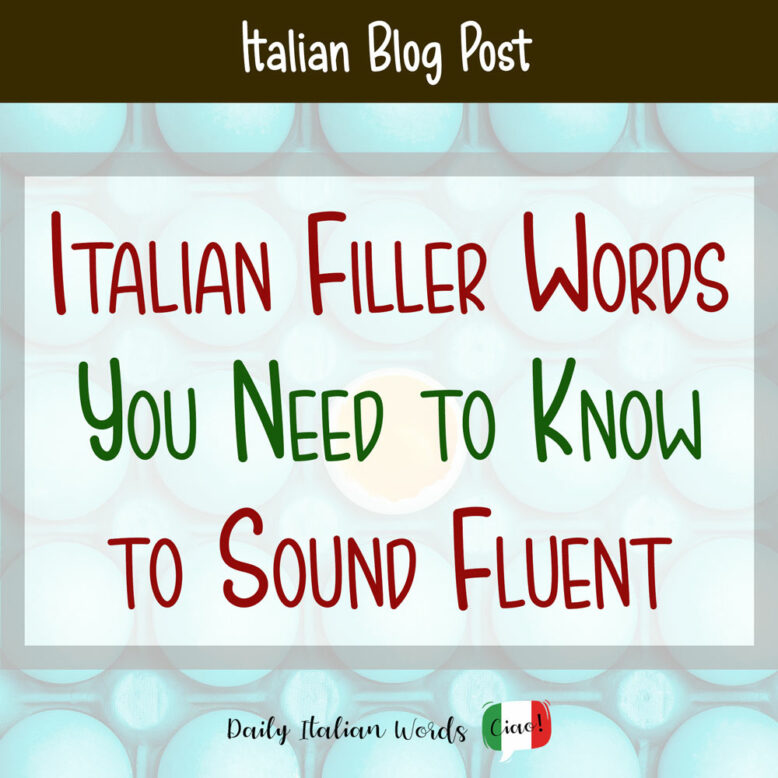We all know that words are important for effective communication but sometimes the right word simply doesn’t come to mind at the right time!
In situations like this, speakers of all languages tend to rely on what are known as filler words in English or riempitivi (fillers) or interiezioni (interjections) in Italian. These are seemingly meaningless terms that mark a pause or hesitation in speech, allowing the speaker to gain time and collect his or her thought before continuing.
English is abound with filler words, including two that many linguistic purists consider almost parasitic in nature – like and you know – but what about Italian? Well, as it turns out, the so-called language of love has plenty of its own, many of which we’ll be covering in this article. Enjoy!

1. Allora
Equivalent English fillers: so, well, then, in that case
Allora is one of those ubiquitous fillers that seems to make its way into most conversations! It is frequently used to introduce a new topic or idea (like well / so) or as a rebuttal (like then / in that case) and may appear at the beginning or end of a sentence.
Allora, cosa mangiamo stasera? Pizza o pasta?
So, what are we going to eat tonight? Pizza or pasta?
Non ho voglia di mangiare di nuovo la pizza. – Va bene, preparo un po’ di pasta allora.
I don’t want to eat pizza again. – All right, I’ll make some pasta then.
2. Dunque
Equivalent English fillers: so, well, now then
Dunque is a classic filler than translates as well, so or now then depending on the context. It is quite similar to allora in its usage, and is thrown into conversation almost as frequently.
Dunque, cosa facciamo stasera? Hai deciso?
Now then, what shall we do tonight? Have you decided?
3. Cioè
Equivalent English fillers: that is, namely, like, I mean, actually
Many Italians tend to overuse cioè just as many English speakers are dependant on fillers such as like or I mean. It comes in handy when you want to clarify, rephrase or correct something you’ve just said.
It is composed of the pronoun ciò (this, that) and è, the third person singular of the verb essere (to be) in the present tense. Note that when said quickly, cioè can sound very much like c’è (there is).
Cioè…non volevo farlo, ma non avevo altra scelta…
I mean…I didn’t want to do it, but I didn’t have another choice…
If used as a question, it is no longer a filler but rather a request for additional information or clarification.
Vado in Inghilterra quest’anno. – Cioè, a fare cosa? – A studiare a Londra.
I’m going to England this year. – Ok, go on, to do what? – To study in London.
4. Nel senso
Equivalent English fillers: that is, I mean, that is to say, in other words
Nel senso literally means in the sense (that) but in speech, it is also used as an interjection to clarify or revise what has just been said, much like cioè.
Non ho cantato così male stasera. Nel senso, ho fatto un po’ meno schifo del solito!
I didn’t sing too badly tonight. I mean, I wasn’t quite as awful as usual!
5. Bene
Equivalent English fillers: well, ok, anyway
Bene literally means good or well but it can also work as a way of politely hinting to the other person that you wish to close a conversation and get on with your day.
Bene, ora vado. È stato un piacere rivederti!
Ok, I’m off. It was lovely to see you again!

6. Be’
Equivalent English fillers: so, well
Be’ (also written as beh or bè) is a very useful filler that, like allora, tends to translate as well or so in English when it introduces a topic. It is short for bene (good).
Sono senza soldi. – Be’, almeno hai la salute!
I have no money. – Well, at least you’re healthy!
Beh? Che cosa fai seduto lì tutto solo?
Well? What are you doing sitting there all alone?
7. Vabbè
Equivalent English fillers: whatever, oh well, alright, see if I care
Vabbè, which comes from the expression va bene (that’s fine, it’s ok), is an expression that communicates resignation or acceptance of an undesirable result or situation. It often implies some level of annoyance or boredom, or at the very best, indifference.
Non vuoi venire al cinema con noi? Vabbè, fai come vuoi.
You don’t want to come to the cinema with us? Alright, do as you please.
Il supermercato è chiuso. – Vabbè, non importa. Finisco di mangiare quello che c’è in frigo.
The supermarket is closed. – Whatever, it doesn’t matter. I’ll finish up what’s in the fridge.
8. Che dire
Equivalent English fillers: what else is there to say, what can I say
The filler che dire is often used at the end of a conversation, usually when you don’t have anything else relevant to add.
Che dire, buona fortuna per questa nuova avventura!
What can I say, good luck on this new adventure!
9. Comunque
Equivalent English fillers: anyway, in any case
Much like the English word anyway, comunque is used to end a conversation, to change the subject / pass over irrelevant details in order to get to the point, or to resume a subject after interruption.
Comunque è andata così. Speriamo che vada meglio la prossima volta.
Anyway, that’s how it went. Hopefully things will go better next time.
10. Guarda
Equivalent English fillers: look
Just like the English look, guarda is used to call attention to what you are going to say.
Guarda, non è che io sia contrario al matrimonio, è solo che sono molto giovani...
Look, it’s not that I’m against the marriage, it’s just that they’re very young…

11. Diciamo
Equivalent English fillers: well (let me explain), you know
Diciamo literally means let’s say / we say but as a filler, it is closer in meaning to you know or well. It is used to soften the statement you have just made or are about to make, or as a lead-in to an explanation.
Tu hai capito di cosa parla questo film? – Più o meno sì… è una storia d’amore, diciamo…
Did you understand what this film is about? – Yes more or less, it’s a love story, you know…
Sei stato bravo quest’anno? – Diciamo…
Have you been good this year? – Well…
12. Ehm
Equivalent English fillers: um, uh
Ehm (along with eh and uhm) is the equivalent of the fillers um or uh in English.
Vieni con noi stasera? – Ehm, no lo so…
Are you coming with us tonight? – Uh, I don’t know…
13. Fammi pensare
Equivalent English fillers: let me think, let’s see
Fammi pensare is a useful filler phrase when you want to make it clear to the other person that you need a few extra seconds to put your thoughts together!
Quando hai iniziato a lavorare qui? – Mmm, fammi pensare…
When did you start working here? – Hmm, let’s see…
14. Insomma
Equivalent English fillers: so, well, all in all, on the whole
Insomma is one of those tricky Italian words that has so many different meanings that it is difficult to translate without a lot of surrounding context. Let’s just say that as a filler, it can mean either all in all / on the whole as in the first example below, or so / well as in the second example.
Insomma, non vale la pena andare a vedere questo film.
All in all, it’s not worth going to see this film.
Insomma, cosa facciamo adesso? Chiamiamo la polizia?
So, what are we going to do now? Call the police?
15. Tutto sommato
Equivalent English fillers: all things considered, all in all, at the end of the day
If you want to summarise something you’ve been talking about, such as an experience or ordeal, you can use the filler tutto sommato as a way of neatly wrapping up the story. It can be considered a synonym for insomma when the latter is translated as all in all.
Tutto sommato, non è stata una brutta esperienza.
All in all, it wasn’t a bad experience.

16. Mah
Equivalent English fillers: well, who knows
Mah is a filler that communicates doubt or uncertainty. Just like boh, it is the vocal equivalent of a shoulder shrug.
Vuoi comprare una macchina nuova? Ci sono delle offerte interessanti. – Mah, non lo so, magari aspettiamo ancora un po’…
Do you want to buy a new car? – Well, I don’t know, maybe let’s wait a little longer…
When used on its own as an exclamation, it translates as Who knows!
Papà tornerà a casa presto stasera? – Mah! Speriamo!
Will dad come home early tonight? – Who knows! Let’s hope so!
You can also use it as a emphasiser in front of the literal translation for Who knows! which is Chi lo sa! In that case, mah becomes more similar in meaning to well (i.e. Mah, chi lo sa! = Well, who knows!).
17. Niente
Equivalent English fillers: anyway, yeah
Niente literally means nothing but as a filler, you can use it to bring a conversation to a close much like the English word anyway.
Quindi niente…direi che ci risentiamo la prossima settimana!
So anyway… I would say we talk again next week.
18. Non so
Equivalent English fillers: I don’t know
The filler non so quite simply means I don’t know and is often used to buy time as you try to organise your thoughts.
Sì è molto gentile però… non so, c’è qualcosa in lei che non mi convince.
Yes, she’s very nice but… I don’t know, there’s something about her that’s a bit off.
19. Boh
Equivalent English fillers: I don’t know, dunno, no clue, no idea, don’t ask me
Boh is one of my favourite Italian fillers. This one small word tells the other person that you don’t know the answer to their question, almost as if you are verbally shrugging your shoulders. It is often followed by the phrases non lo so (I don’t know) or che ne so io (how should I know) to add extra emphasis.
Quindi è possibile secondo te? – Boh, direi di sì.
So is it possible do you think? – Dunno, I would say so.
Ma dov’è Marco? – Boh, che ne so io!
Hey, where is Marco? – How should I know!
If they are feeling really lazy, Italians might just answer with boh on its own and make the the “o” sound longer. It becomes the equivalent of I dunno or No idea.
20. Onestamente
Equivalent English fillers: honestly
Onestamente is used in the same way as honestly in that it helps you to buy time while also softening the tone of the sentence.
Onestamente, il tuo piano mi sembra un po’ troppo complicato.
Honestly, your plan seems a bit too complicated to me.

21. Praticamente
Equivalent English fillers: basically, practically, pretty much, you know
When used as a filler, praticamente, like basically or practically in English, doesn’t really serve any purpose other than allowing the speaker more time to formulate their ideas. Like cioè, it is one of those meaningless fillers that constantly pops up in conversation, especially between young people.
Mi sono perso il finale del film. Puoi dirmi com’è finita? – Sì… praticamente l’eroe salva la città ma il cattivo riesce a scappare all’ultimo minuto.
I missed the ending of the movie. Can you tell me how it ends? – Yes… basically the hero saves the city but the villain manages to escape at the last minute.
Ma quindi il film finisce bene? – Praticamente… l’eroe salva la città ma il cattivo riesce a scappare.
So does the movie ends well? – Pretty much… the hero saves the city but the villain manages to escape.
22. Sostanzialmente
Equivalent English fillers: basically, substantially
Sostanzialmente is very similar in nature to praticamente in that it is a meaningless filler that gives you time to think about what you want to say next. Because it is a long and complex-sounding word, many speakers (either knowingly or not) throw it into conversation to make themselves sound more intelligent!
Quindi, sostanzialmente, sono andato a letto alle tre di notte.
So basically, I went to bed at three o’clock.
23. Per intenderci
Equivalent English fillers: to be clear, put simply, don’t get me wrong, let’s get one thing straight
If you want to clarify a statement you’ve just made and leave no room for ambiguity, you can use the interjection per intenderci. It usually sits at the beginning or end of a phrase.
Sai dove posso trovare un’altro cacciavite come questo? Con la punta a stella, per intenderci.
Do you know where I can find another screwdriver like this? With the star tip, just to be clear.
A variation of this filler is intendiamoci which is the first personal plural imperative of the verb intendere (to understand) and means let’s be clear (lit. let’s understand each other).
Intendiamoci, non c’è bisogno di chissà quale attrezzo sofisticato, basta un cacciavite!
Let’s be clear, there is no need for who knows what sophisticated tool, a screwdriver is enough.
24. Sai
Equivalent English fillers: you know
Sai works in exactly the same way as the English filler you know…and it is just as overused!
Crescere i figli non è mica facile, sai!
Bringing up kids isn’t easy, you know!
25. Senti
Equivalent English fillers: listen
The filler senti is used to urge someone to pay attention to what you are going to say, just like the English equivalent listen.
Senti, ho avuto un’idea!
Listen, I have an idea!

As with English, it is common to use more than one filler in the same sentence. For example:
- Insomma… diciamo che la cena non è stata un disastro totale. = Well… let’s say that the dinner wasn’t a complete disaster.
- Vabbè, tutto sommato la cena non è andata poi così male. = Oh well, all in all the dinner wasn’t so bad.
Just make sure not to use too many of them or you’ll give the impression that you don’t know what to say!
Heather Broster is a graduate with honours in linguistics from the University of Western Ontario. She is an aspiring polyglot, proficient in English and Italian, as well as Japanese, Welsh, and French to varying degrees of fluency. Originally from Toronto, Heather has resided in various countries, notably Italy for a period of six years. Her primary focus lies in the fields of language acquisition, education, and bilingual instruction.


